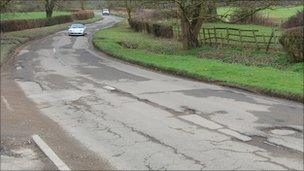Speed limits: 40mph plan for country roads
- Published
- comments

Speed limits on many rural roads in England could be cut from 60mph to 40mph under government proposals.
The reduction should be considered by councils on roads with "many bends or junctions", the Department for Transport (DfT) says in draft guidance .
Some 49% of road deaths in 2010 in the UK took place on single carriageway rural roads with a 60mph speed limit.
Road Safety Minister Mike Penning said it was "vital that speed limits are suitable for local conditions".
The vast majority of rural single-carriageway roads are subject to the national speed limit of 60mph.
Under the plans, which are open to public consultation , a reduction to 40mph should also be considered where there is "substantial development" or where there are "a considerable number" of horse-riders, pedestrians, cyclists and motorcyclists.
A reduction to 50mph would be considered for "lower quality A and B roads" with "a relatively high number" of bends or junctions and where mean speeds are already below 50mph.
DfT figures for 2010 show that 68% of road deaths in Britain took place on rural roads.
Ralph Smyth, from the Campaign to Protect Rural England, called for "a presumption that minor rural roads, the narrower winding ones, have a lower speed limit".
"It seems strange that you've got minor roads, often that are just tarmaced tracks, that have a speed limit of 60mph - just 10mph less than the motorways," he told BBC Radio 4's Today programme.
He said councils could already reduce limits on such roads but that they were legally obliged to erect expensive "repeater" signs along the way.
"We're saying a much better solution would be to use 40mph zones, similar to the 20mph zones in urban areas, where there isn't the requirement to have the signs every few hundred metres.
"And, of course, that doesn't just mean less cost it means less clutter in the countryside," he added.
He said drivers should also be educated that "these are different to the other sorts of roads they use, almost like a separate network where you could expect to find someone walking their dog, a cyclist or some livestock around the next blind bend".
'Top priority'
Milly Wastie, vice-chairwoman of the National Federation of Young Farmers' Clubs, meanwhile, said raising awareness about driving conditions in rural areas was key to reducing accidents.
"I think instead of lowering the speeds on rural roads it's more about education and awareness and I think it's how to drive and how to manage different driving conditions," she told Today.
"You're only starting to learn how to handle these conditions when you pass your test and, from a young person's point of view, obviously we're the most at risk."
Road safety charity Brake said it "fully supported" the proposal to make it easier for local authorities to lower speed limits.
"Sixty miles per hour is far too fast for safety on many rural roads," deputy chief executive Julie Townsend said.
She said lowering speed limits was an effective way to reduce crashes and casualties though some drivers would continue to speed "which is why it's also important that we enforce these limits".
"Ultimately we would like to see our default speed limits lowered," she said.
Under the new guidelines, English councils will also be given more freedom to introduce 20mph speed limits as well as to use variable speed limits outside schools.
The DfT says there are about 2,000 of the 20mph schemes in England; it cites research suggesting they can reduce collisions and injuries by 60%.
A new online speed limit appraisal tool will help councils to assess the benefits and costs of such schemes.
"Road safety is a top priority and the guidance will help councils make evidence-based decisions to introduce local speed limits that reflect the needs of all road users," Road Safety Minister Mr Penning said.
No changes are planned to the national speed limits of 30mph on street-lit roads, 60mph on single carriageway roads and 70mph on dual carriageways and motorways.
In Northern Ireland, the Department for Regional Development's Roads Service has the powers to introduce local speed limits where national limits are deemed inappropriate.
And policy in Wales is covered by guidance for local authorities published by the Welsh Assembly in October 2009 which, among other things, aimed to extend 20mph zones.
The Scottish government was given devolved powers under the Scotland Act, introduced in May, to set its own speed limits.
There has been pressure from campaigners to introduce 50mph limits for many rural roads and 20mph limits for all towns and cities, but plans for changes have yet to be announced.